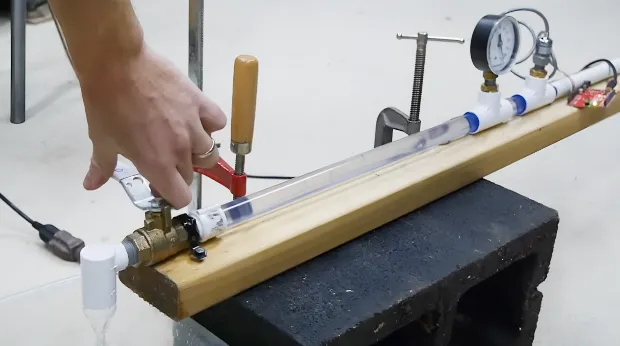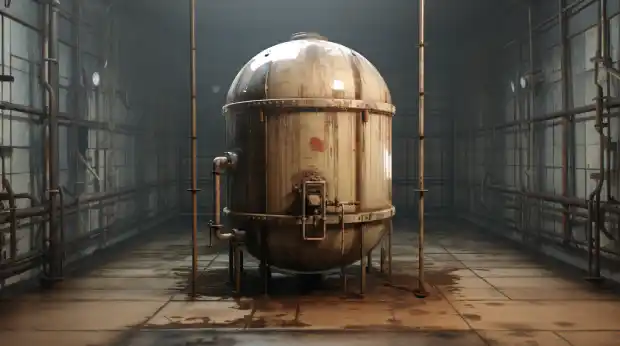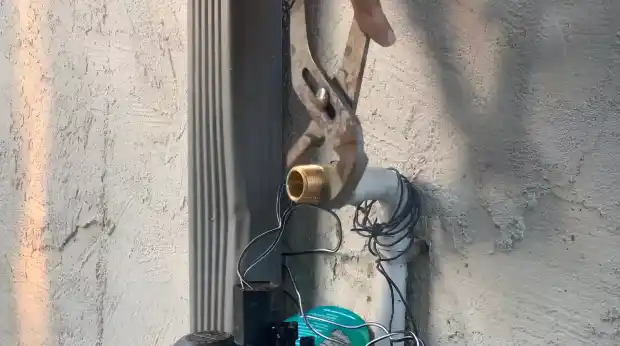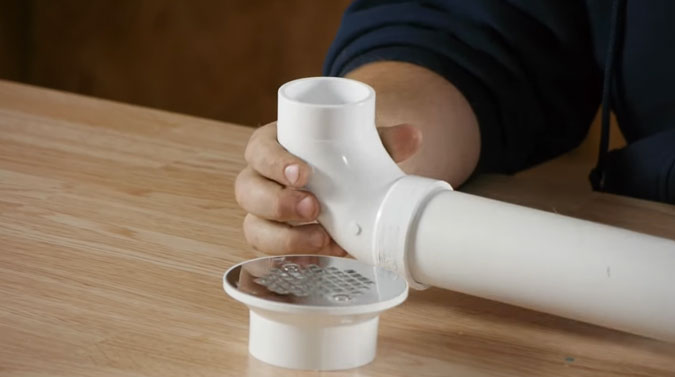If you suddenly hear banging, thudding, or knocking sounds from your water pipes, you may be experiencing something called a water hammer. Water slams against your pipes when there’s a rapid change in pressure in your plumbing system, creating a lot of noise and potentially damaging them.
One of the primary causes of water hammering is rapid valve closure, which leads to an influx of water pressure and a sudden surge of water flow. Also, a non-return valve located too far above the water level can create a partial vacuum, causing a hammering sound.
Today we’ll discuss the reasons behind this annoying problem and provide you with practical solutions to put an end to the hammering once and for all. So keep reading to tackle this issue head-on.
Why Does My Water Pipes Hammer When My Well Pump Kicks On: Reasons with Solutions

When you’re experiencing a hammering sound in your water pipes when your well pump kicks on, there are several potential reasons to consider.
- Non-return valve location and condition
- Rapid valve closure
- Trapped air in the pipes
- Waterlogged pressure tank
- Loose or weak pipe mounting
- High water velocity
- Inadequate pipe sizing
- Faulty pressure regulator
Let’s discuss these reasons in detail:
1. Non-Return Valve Location and Condition
The water hammering issue may be caused by the non-return valve being positioned too far above the water level or if it is leaky or malfunctioning.
When the non-return valve is situated too high above the water level, typically exceeding 9 meters or 30 feet, it can create a partial vacuum in the downpipe. This vacuum can lead to sudden and forceful water movement, resulting in the characteristic hammering sound.
Also, if the non-return valve is leaky or malfunctioning, it can exacerbate the problem by allowing water to flow back and forth, causing rapid pressure changes and further contributing to the water hammer effect.
Ensuring the non-return valve is properly positioned and in good working condition is crucial to mitigate water hammering in your system.
2. Rapid Valve Closure
When valves in the plumbing system close too quickly, it can cause a sudden cessation of water flow, resulting in a shockwave that travels through the pipes and causes a banging noise. This phenomenon is known as the water hammer.
Water hammer occurs when the momentum of the water is abruptly stopped, creating a pressure surge that reverberates through the pipes. The force of the shockwave can be strong enough to cause the pipes to vibrate and produce a distinct banging sound.
Factors such as faulty or worn-out valves, improper installation, or high water pressure can cause rapid valve closure. To prevent water hammering, ensure that the valves in the plumbing system close gradually, allowing the water to decelerate smoothly and preventing the formation of shockwaves.
3. Trapped Air in the Pipes
Trapped air in pipes can worsen water hammering, causing more pressure waves and a louder banging noise. When air becomes trapped in the pipes, it can compress and create additional pressure waves when water flow changes suddenly.
This can amplify the hammering noise and increase the potential for pipe damage. To understand how trapped air exacerbates water hammer, consider the following table:
| Situation | Effect |
| Air trapped near valve closure | Amplifies pressure waves and noise |
| Air trapped in long, horizontal pipes | Increases the distance for pressure waves to travel |
| Air trapped in vertical pipes | Enhances the force of pressure waves on pipe walls |
4. Waterlogged Pressure Tank

A waterlogged pressure tank occurs when there is an excessive amount of water inside and not enough air. When the well pump kicks on, the pressure tank cannot properly absorb the pressure changes, leading to rapid fluctuations in water pressure.
This can cause the water pipes to hammer, creating loud banging noises and potentially damaging the plumbing system. To prevent this, regularly check the pressure tank’s air-to-water ratio and ensure it functions correctly.
If the pressure tank is waterlogged, it may need to be drained and recharged with air to restore its proper function and prevent further water hammer issues.
5. Loose or Weak Pipe Mounting
If the pipes aren’t securely fastened to their supports, the force of the water flow from the well pump can cause them to vibrate and move, potentially leading to the hammering noise. Loose or weak pipe mounting is a common issue that can result in this problem.
When the pipes are not properly secured, the water flowing through them creates a force that causes them to shake and rattle against their supports. This can create a loud hammering noise that echoes throughout your plumbing system.
To prevent this issue, it is important to ensure that all pipe supports are tightly fastened and capable of withstanding the force of the water flow. This will eliminate any movement or vibration leading to hammering noise.
6. High Water Velocity
When the water velocity is too high, you may experience increased pressure surges and water hammer. This occurs because the high velocity of the water creates a significant amount of momentum as it flows through the pipes.
When the flow suddenly stops, such as when the well pump kicks on, the momentum of the water causes it to collide with the closed valve or pipe end, resulting in pressure surges.
These pressure surges can create a loud banging noise, commonly known as water hammer. Also, the sudden change in flow direction can cause the pipes to vibrate, leading to potential damage or leaks.
To prevent these issues, ensuring that the water velocity is properly regulated and within acceptable limits for your system is important.
7. Inadequate Pipe Sizing
When the diameter of the pipes is too small, it restricts the flow of water, leading to increased velocity. Therefore, if there is a sudden change in water flow, like when your well pump kicks on, the high velocity can cause pressure surges and cause the pipes to vibrate and shake, so you hear hammering.
To prevent this issue, consult with a professional plumber who can evaluate the sizing requirements of your plumbing system and make necessary adjustments to ensure proper flow and minimize the risk of water hammer.
8. Faulty Pressure Regulator
Lastly, a faulty pressure regulator can lead to sudden pressure changes in the plumbing system, potentially causing water hammer. The pressure regulator maintains a consistent water pressure throughout the system by controlling the water flow.
When the regulator malfunctions, it can fail to regulate the pressure properly, resulting in sudden bursts of high pressure. These pressure spikes can cause the water to slam against the pipes, creating the characteristic hammering sound.
Also, sudden pressure changes can cause stress on the pipes and fittings, increasing the risk of leaks or even pipe bursts.
If you suspect your pressure regulator is faulty, have it inspected and repaired or replaced by a qualified plumber to prevent further damage to your plumbing system.
How do I stop my well pump water hammer?

To prevent water hammering caused by your well pump, consider opting for a steep-curve pump that allows for precise flow rate control by controlling the pump speed.
Water hammer occurs when there is a sudden change in flow rate, resulting in a rapid increase in pressure within the pipes. Using a steep-curve pump, you can adjust the pump speed to match the desired flow rate, minimizing the potential for a water hammer.
This type of pump has a characteristic curve that shows a steeper slope, indicating a more linear relationship between pressure and flow rate.
Will turning down the water pressure stop the water hammer in a well pump?
Turning down the water pressure can help alleviate the water hammer in a well pump. When the water pressure is too high, it can cause a sudden surge of water when the well pump kicks on, resulting in a banging or hammering sound in the pipes.
By reducing the water pressure, you can minimize the force of the water flow and prevent the occurrence of a water hammer. To understand how water pressure affects the water hammer, let’s take a look at the table below:
| Water Pressure | Water Hammer |
| High | Likely |
| Moderate | Possible |
| Low | Unlikely |
| Very Low | Rare |
| Optimal Pressure | None |
How long does it take to get the air out of well pump water lines?
To get rid of the air that may be causing the water hammer, let the water run through all of your faucets for about 10-15 minutes. During this time, the air will gradually be flushed out of the water lines, allowing for a steady stream of water without any noise or disruption.
Reducing the water pressure in your well pump can help alleviate water hammering, a common issue when the flow of water is suddenly stopped or changed direction.
Fix Water Hammer in Water Pipes to Avoid Costly Damage
Water hammering can be a frustrating and concerning phenomenon. It can cause damage to pipes and fittings over time, leading to leaks and costly repairs. The good news is that most causes of water hammering can be addressed with relatively simple solutions.
By identifying the source of the issue, whether it’s the location and condition of your non-return valve, rapid valve closure, trapped air in the pipes, waterlogged pressure tank, loose or weak pipe mounting, high water velocity, inadequate pipe sizing, or faulty pressure regulator, you can take the appropriate steps to fix it.
So don’t delay addressing the water hammer, it’s better to deal with it sooner rather than later to prevent further damage.


